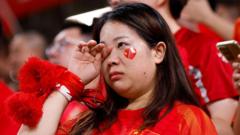China embraced football dreams under President Xi Jinping, who aimed to see the nation shine on the world stage. However, recent dismal performances, including being ranked 90th globally, have raised questions about the effectiveness of a top-down approach that fails to nurture talent organically.
The pivotal year of 2023 bore witness to a series of brutal losses for the national team, a stark contrast to Xi's vision of glory. Following the loss to Japan, rumors of match-fixing and gambling scandals gripped the sport, resulting in arrests of players and officials. The fall of several once-prominent clubs due to financial challenges further compounds the crisis, illustrating a pattern of mismanagement and corruption that has tainted the game at various levels.
While the women's football team gradually earns recognition, the men's team's embarrassing rankings overshadow their efforts. Many suggest that the solution lies in fostering a grassroots culture, with a focus on long-term development rather than short-term fixes imposed by bureaucratic mandates.
Football in China needs a deep transformation away from government intervention, as seen in successful footballing nations worldwide, to create an environment where players can develop skills organically. As fans continue to express both disappointment and humor over their predicament, the need for a fundamental shift in policy and practice has never been more urgent.
Reflecting on these challenges, one fan recently mused, "Football can't thrive through political means." The sentiment echoes the broader understanding that genuine growth in sports requires community engagement and autonomous governance—qualities that remain off the table under China's current political system. While the fans hold onto hope, the path to success in football remains fraught with obstacles.
The pivotal year of 2023 bore witness to a series of brutal losses for the national team, a stark contrast to Xi's vision of glory. Following the loss to Japan, rumors of match-fixing and gambling scandals gripped the sport, resulting in arrests of players and officials. The fall of several once-prominent clubs due to financial challenges further compounds the crisis, illustrating a pattern of mismanagement and corruption that has tainted the game at various levels.
While the women's football team gradually earns recognition, the men's team's embarrassing rankings overshadow their efforts. Many suggest that the solution lies in fostering a grassroots culture, with a focus on long-term development rather than short-term fixes imposed by bureaucratic mandates.
Football in China needs a deep transformation away from government intervention, as seen in successful footballing nations worldwide, to create an environment where players can develop skills organically. As fans continue to express both disappointment and humor over their predicament, the need for a fundamental shift in policy and practice has never been more urgent.
Reflecting on these challenges, one fan recently mused, "Football can't thrive through political means." The sentiment echoes the broader understanding that genuine growth in sports requires community engagement and autonomous governance—qualities that remain off the table under China's current political system. While the fans hold onto hope, the path to success in football remains fraught with obstacles.



















